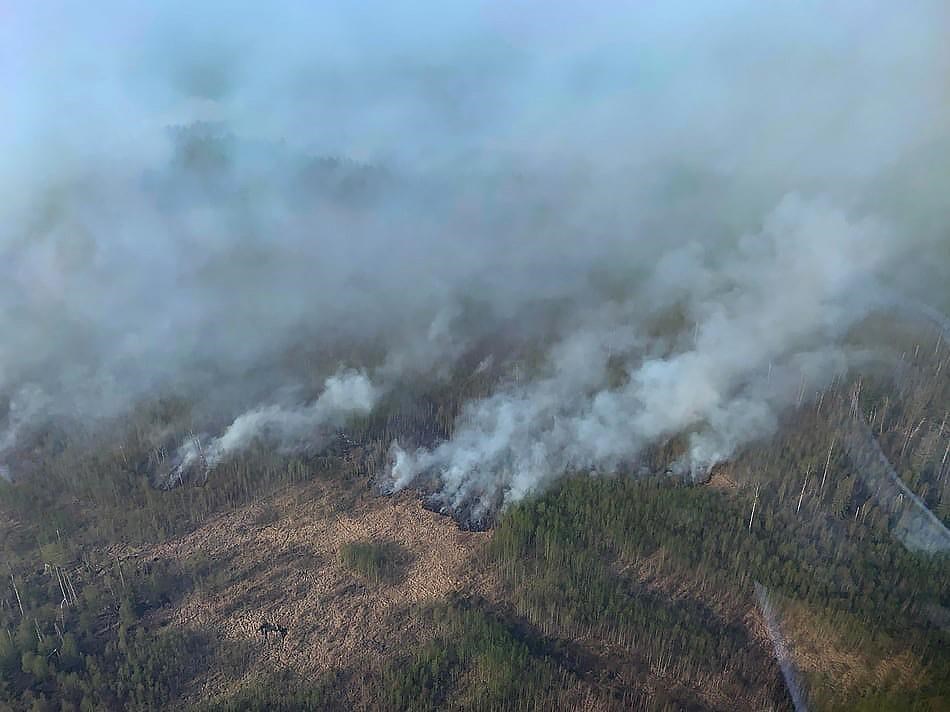EDMONTON — Alberta's decision to cancel funding for an elite wildfire-fighting crew in 2019 came despite pleas to keep the Rapattack program from at least three municipalities, including one that has since been evacuated during this spring's blazes.
"Rapattack is a pivotal program in the fight against wildfire and without them communities will be losing a valuable resource," wrote Jim Hailes, then mayor of Fox Creek, to Devin Dreeshen, then the United Conservative forestry minister.Â
Fox Creek's 1,700 residents are expected to be out of their homes until at least Wednesday.Â
Rapattack firefighters are rappelled from helicopters to douse wildfires while they still only covered a few hectares. They could extinguish small fires before they merge and clear landing spaces for other helicopters to bring in crews and gear.
There were once 63 such firefighters stationed around the province before the government cancelled the program in 2019, saving $1.4 million.
Before it did, at least three communities wrote the government in its support.Â
"Without these crews and the abilities of the Rapattack program, I fear we will one day lose houses or our community," wrote Scott Sheldrake, who directed fire response for the west-central community of Nordegg at the time. Â
"I have worked directly with these crews and can tell you the effectiveness of them."
Sheldrake recalled a case in which a car went off the road, caught fire and ignited nearby tree crowns. It took him and his crew an hour to reach the site.
"I was very relieved to hear a wildland crew with a helicopter was on its way and was finishing extinguishing the crown fire as we arrived," he wrote.
Also at the time, council of the southern community of Crowsnest Pass passed a motion in favour of the Rapattack program.
"Our municipality has first-hand knowledge of the benefits of this program," Mayor Blair Painter wrote in a letter to Dreeshen. "We believe the program is a very valuable asset in early response and prevention of wildfires growing out of control."Â
On Monday, former Rapattack members, as well as current firefighters, said the program's cancellation deprived Alberta of a powerful weapon it could have used against this spring's fires.
Those fires now number nearly 100. Almost 30,000 people have been evacuated from their homes and several energy companies have been forced to shut down.Â
Heather Sweet, provincial New Democrat forestry critic, said Rapattack was vital to preventing the spread of wildfires.Â
"It was a mistake to cut them," she said Tuesday in an email. "It was a short-sighted move by the UCP that will put communities at risk and cost our province more in the long term."
Asked about the cut, Premier Danielle Smith said the province's firefighting capacity will be examined.
"Having a 10-times-worse fire event than we've ever seen is going to have to make us analyze what we need for baseline support," she said. "I've already raised this with the civil service."
Smith said Alberta's regular firefighting capacity can't be expected to be able to deal with fires at what she called this spring's "extraordinary" level. Â
However, the government's own documents suggest that extraordinary is becoming less so.Â
While the years 2020-22 were relatively quiet in Alberta, the province's wildfire agency called 2019 "one of the worst on record" with "an extraordinary spring."Â
Alberta Wildfire called 2016's fire that scorched Fort McMurray "the worst wildfire experience in recent Canadian history."Â
It said the previous year "was extraordinary in terms of wildfire conditions, number of fires, number of hectares burned and expenditures."
The agency's 2016 report contained a warning.
"More intense wildfires are inevitable and are becoming increasingly more likely."
Scientists suggest climate change is lengthening the fire season and drying out the forest, increasing both the likelihood of wildfires and their intensity.Â
Sheldrake, reached Tuesday in Nordegg, said his opinion of the Rapattack cuts hasn't changed.
"I was dumbfounded they would get rid of an invaluable service," he said.Â
This report by The Canadian Press was first published May 10, 2023.
Bob Weber, The Canadian Press




